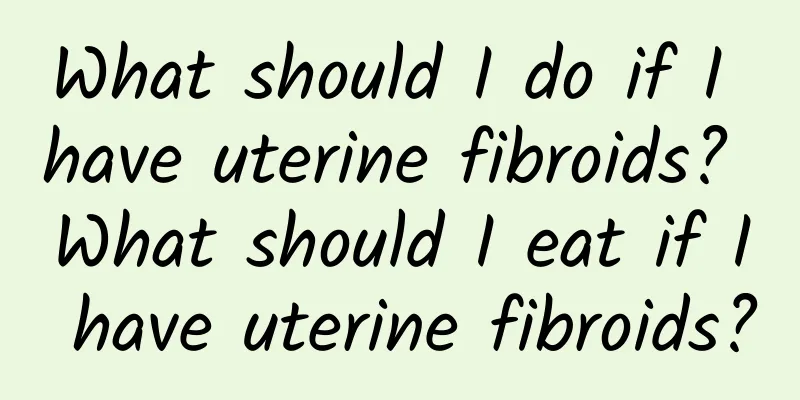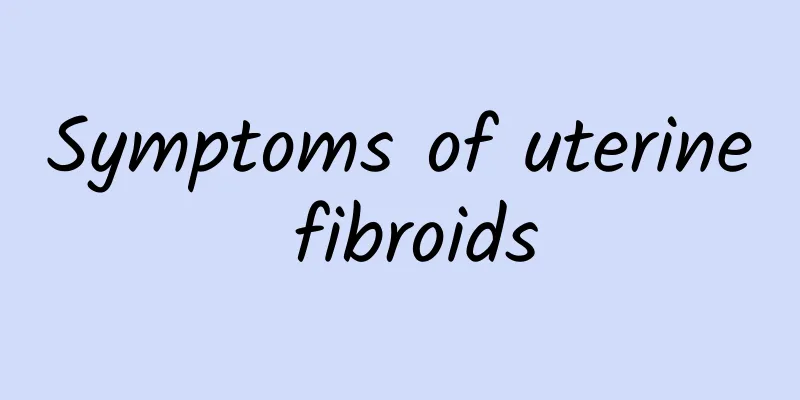What should I do if I have uterine fibroids? What should I eat if I have uterine fibroids?

|
The uterus is an important organ of female reproduction. Once the uterus is diseased, it will have a great impact on the patient's fertility and other aspects. Therefore, it is recommended that female friends pay more attention to the health of the uterus in daily life. First of all, let me tell you how to prevent uterine fibroids. What should I do if I have uterine fibroids? (1) Patients must prevent themselves from excessive fatigue in daily life and must take a rest during menstruation. (2) Patients are advised to eat more fresh vegetables and fruits and less spicy food. (3) The patient must keep the vulva clean and wear loose underwear. If the amount of vaginal discharge increases significantly, the vulva must be washed at any time. (4) Once diagnosed with uterine fibroids, you should go to the hospital for a checkup once a month. If the fibroids grow slowly or not at all, you can go to the hospital for a checkup every six months; if they grow significantly, surgical treatment must be considered to avoid severe bleeding or compression of abdominal organs. (5) Women with uterine fibroids should try to avoid getting pregnant again. The uterus may not recover well after an abortion, which often causes long-term bleeding or chronic genital inflammation. Diet therapy for uterine fibroids Tremella and Lotus Root Powder Soup 25 grams of white fungus, 10 grams of lotus root powder, add appropriate amount of sugar, soak the white fungus, and then add appropriate amount of rock sugar to stew. Efficacy: It has the effects of clearing away heat, moistening dryness and stopping bleeding. Suitable for people with heavy menstrual flow and bright red blood. Two fresh soup 120 grams of fresh lotus root and 120 grams of fresh imperata root, also chop them into small pieces, boil them in water and use the juice as tea. Efficacy: nourishing yin and cooling blood, removing blood stasis and stopping bleeding. Suitable for heavy menstruation and blood heat and blood stasis. Dietary arrangements for patients with uterine fibroids 1. Be sure to eat regularly and in fixed amounts. Don’t be too hungry or too full, and don’t eat too much. Second, you should adopt a low-fat diet and eat more fresh vegetables, fruits, lean meat, etc. Also eat more whole grains such as beans and corn. 3. Eat some high-nutrition dried fruits, such as melon seeds, sesame seeds, etc., to supplement the trace elements needed by the body. 4. Do not eat spicy, cold or irritating foods to avoid inducing uterine fibroids. How to care after uterine fibroid surgery? Wound care Laparoscopic wounds are usually one centimeter long at the navel, and are usually sutured simply after surgery. If non-absorbable sutures are used, they need to be removed within 7 days after surgery. If absorbable sutures are used, there is no need to remove the sutures. To care for this type of wound, you need to keep the wound clean and dry, and you can only shower or touch water after the wound heals. Since laparoscopic patients have a short hospital stay, family members or themselves should pay attention to whether there is redness, swelling, heat and pain every day to prevent infection and inflammation. However, inflammation after laparoscopic surgery is usually rare. Vaginal bleeding In order to check the ovaries, fallopian tubes and the back of the uterus and provide enough space for surgery, a uterine support is usually placed in the vagina to adjust the position of the uterus, so a small amount of vaginal bleeding may occur after surgery, which is normal. However, if vaginal bleeding lasts for more than two weeks, you need to consult a doctor to find out if there is anything abnormal. In addition, patients who undergo laparoscopic hysterectomy will suture the stump at the top of the vagina after the uterus is removed, so brown bleeding within two weeks after surgery is normal. It should be noted that if you have a room or receive heavy objects within 8 weeks after surgery, the wound will not heal well, resulting in bleeding from the stump, so it should be avoided as much as possible. Daily life Patients need a quiet and comfortable recovery environment and proper exercise, which is very helpful for physical recovery. Two weeks after laparoscopic fallopian tube surgery and laparoscopic ovarian surgery, patients can resume normal work and rest. In addition, patients who have completed total hysterectomy should avoid riding horses, cycling, sitting for a long time, etc. within two weeks after surgery to prevent pelvic congestion and discomfort. At the same time, patients should pay special attention not to carry more than 5 kg of weight or activities that increase the burden on the abdomen. Eight weeks after surgery, patients can slowly increase the amount of exercise according to their personal physical strength and physique to avoid discomfort caused by temporary reduction in pelvic support. How to prevent uterine fibroids? Method 1 to prevent uterine fibroids: Diet is crucial to preventing diseases. If you want to stay away from uterine fibroids, you should eat more vegetables and fruits, and try not to eat spicy stimulants. In addition, we should also pay attention to the combination of work and rest, avoid overwork, especially pay attention to more rest during menstruation, and don't catch a cold. If you have excessive menstruation, that is, excessive bleeding, you should eat more iron-rich foods to avoid causing iron deficiency anemia. Finally, be careful not to take in extra estrogen, especially after menopause, to prevent uterine fibroids from gradually growing larger. Method 2 to prevent uterine fibroids: Female friends should always pay attention to keeping the vulva clean and dry. It is recommended that you wear loose underwear. If you often have too much leucorrhea, you should pay attention to washing the vulva frequently to keep the vulva clean. If you are diagnosed with uterine fibroids, you must go to the hospital for treatment in time, and go to the hospital for regular examinations, do a good job of reexamination, and avoid recurrence. Women with uterine fibroids are better not to get pregnant again. If they have an abortion, they may have long-term bleeding or chronic genital inflammation a year ago. |
<<: What are the symptoms of uterine fibroids? What should I do if I have uterine fibroids?
Recommend
How to recover better after painless abortion
There are many precautions after painless abortio...
How to care for pelvic effusion surgery
Pelvic effusion requires surgical treatment, but ...
What to do with leftovers from the New Year holidays? Do not reheat the pan more than 2 times
Be careful when reheating New Year's Eve meal...
Is microwave treatment good for chronic cervicitis? Three effective treatment options for chronic cervicitis
Chronic cervicitis is a common gynecological dise...
Expert introduction: Effective TCM treatment for irregular menstruation
Traditional Chinese medicine is a very good way t...
Three main predisposing factors of vaginitis in the elderly
The cause of vaginitis in the elderly is mostly d...
Control oil and calories in New Year's dishes, and focus on four less and one more
During the Spring Festival, families gather toget...
Vegetarian food mixed with meat! Amitabha accidentally stepped on a landmine and broke his precepts
There are about 2 million vegetarians in the coun...
How can cervical erosion be identified? Does cervical erosion require medication?
How can cervical erosion be identified? Do I need...
What should I do if I have multiple uterine fibroids?
Multiple uterine fibroids are the most common ben...
What to eat during menstruation to detoxify? Eat some whole grains
The menstrual period for women is a process of de...
Precautions after surgery for cervical precancerous lesions
Postoperative care for cervical precancerous lesi...
Experts explain several symptoms of chronic pelvic inflammatory disease
Chronic pelvic inflammatory disease develops from...
Is there a direct relationship between cervical erosion and cervical cancer?
Cervical erosion is quite common in daily life. M...
Prevention of cervicitis
To prevent cervicitis, you should keep your vulva...









